Ward A.W. The Cambridge History of British Foreign Policy. 1783-1919. Volume 3
Подождите немного. Документ загружается.

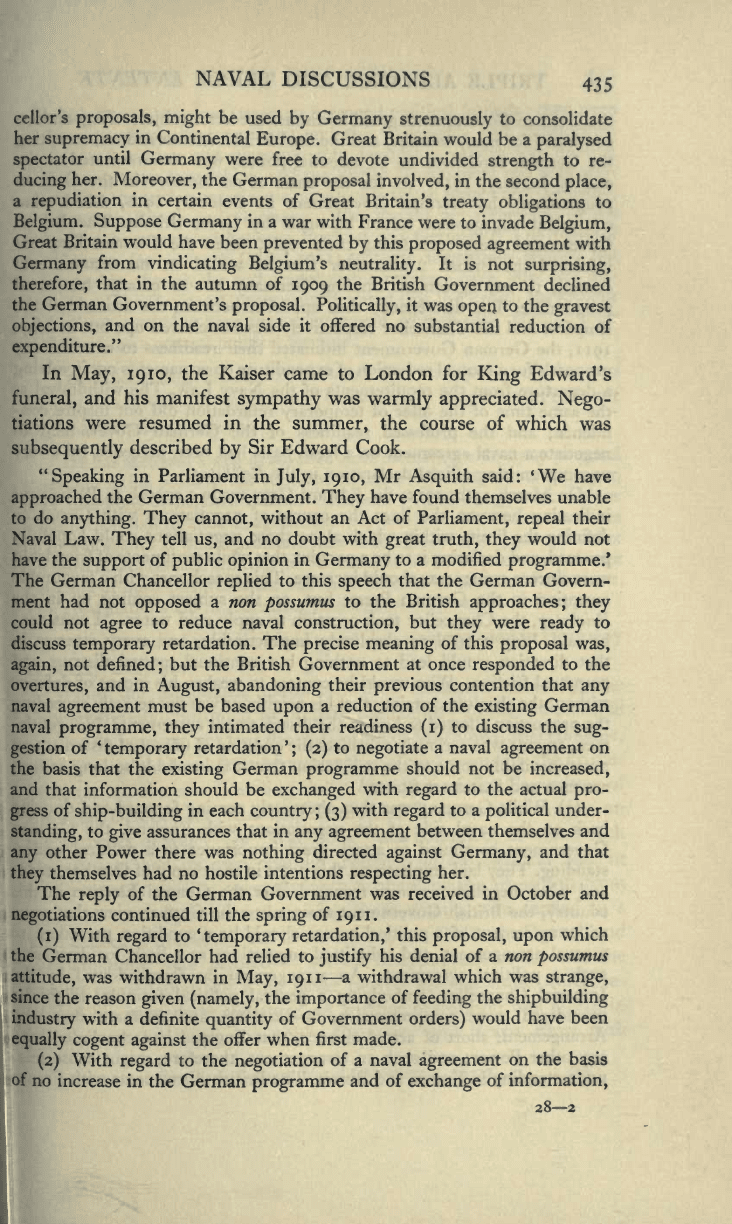
NAVAL
DISCUSSIONS
435
ccllor's
proposals,
might
be
used
by
Germany strenuously
to
consolidate
her
supremacy
in
Continental
Europe.
Great Britain
would be
a
paralysed
spectator
until
Germany
were free to
devote
undivided
strength
to
re-
ducing
her.
Moreover,
the
German
proposal
involved,
in
the
second
place,
a
repudiation
in
certain
events of
Great
Britain's
treaty
obligations
to
Belgium.
Suppose
Germany
in a war
with
France were to
invade
Belgium,
Great
Britain would
have been
prevented
by
this
proposed
agreement
with
Germany
from
vindicating Belgium's
neutrality.
It is
not
surprising,
therefore,
that
in
the autumn of
1909
the British
Government
declined
the
German
Government's
proposal.
Politically,
it was
open
to the
gravest
objections,
and on
the
naval
side
it
offered
no
substantial
reduction of
expenditure."
In
May,
19
10,
the Kaiser
came to London for
King
Edward's
funeral,
and his
manifest
sympathy
was
warmly
appreciated.
Nego-
tiations
were resumed in
the
summer,
the course of which
was
subsequently
described
by
Sir
Edward Cook.
"Speaking
in Parliament in
July, 1910,
Mr
Asquith
said:
'We have
approached
the German Government.
They
have found
themselves unable
to do
anything. They
cannot,
without
an
Act of
Parliament,
repeal
their
Naval
Law.
They
tell
us,
and
no
doubt with
great
truth,
they
would
not
have
the
support
of
public opinion
in
Germany
to a
modified
programme/
The German
Chancellor
replied
to this
speech
that the German
Govern-
ment
had
not
opposed
a non
possumus
to the
British
approaches;
they
could not
agree
to reduce naval
construction,
but
they
were
ready
to
discuss
temporary
retardation.
The
precise
meaning
of
this
proposal
was,
again,
not
defined;
but the
British Government
at once
responded
to the
overtures,
and
in
August,
abandoning
their
previous
contention that
any
naval
agreement
must
be
based
upon
a reduction
of
the
existing
German
naval
programme,
they
intimated
their readiness
(1)
to
discuss the
sug-
gestion
of
'
temporary
retardation
'
;
(2)
to
negotiate
a
naval
agreement
on
the
basis
that
the
existing
German
programme
should not be
increased,
and
that
information should be
exchanged
with
regard
to
the
actual
pro-
gress
of
ship-building
in
each
country; (3)
with
regard
to
a
political
under-
standing,
to
give
assurances
that in
any
agreement
between
themselves
and
any
other
Power there
was
nothing
directed
against Germany,
and that
they
themselves had no hostile
intentions
respecting
her.
The
reply
of
the German
Government
was received
in
October
and
negotiations
continued till the
spring
of
191
1.
(1)
With
regard
to
'temporary
retardation,'
this
proposal,
upon
which
the
German
Chancellor had relied
to
justify
his
denial of a non
possumus
attitude,
was
withdrawn in
May, 191
1
—
a withdrawal
which
was
strange,
since
the
reason
given
(namely,
the
importance
of
feeding
the
shipbuilding
industry
with a
definite
quantity
of Government
orders)
would have
been
equally
cogent
against
the offer
when first made.
(2)
With
regard
to the
negotiation
of a naval
agreement
on the
basis
of
no
increase
in
the German
programme
and of
exchange
of
information,
28—2
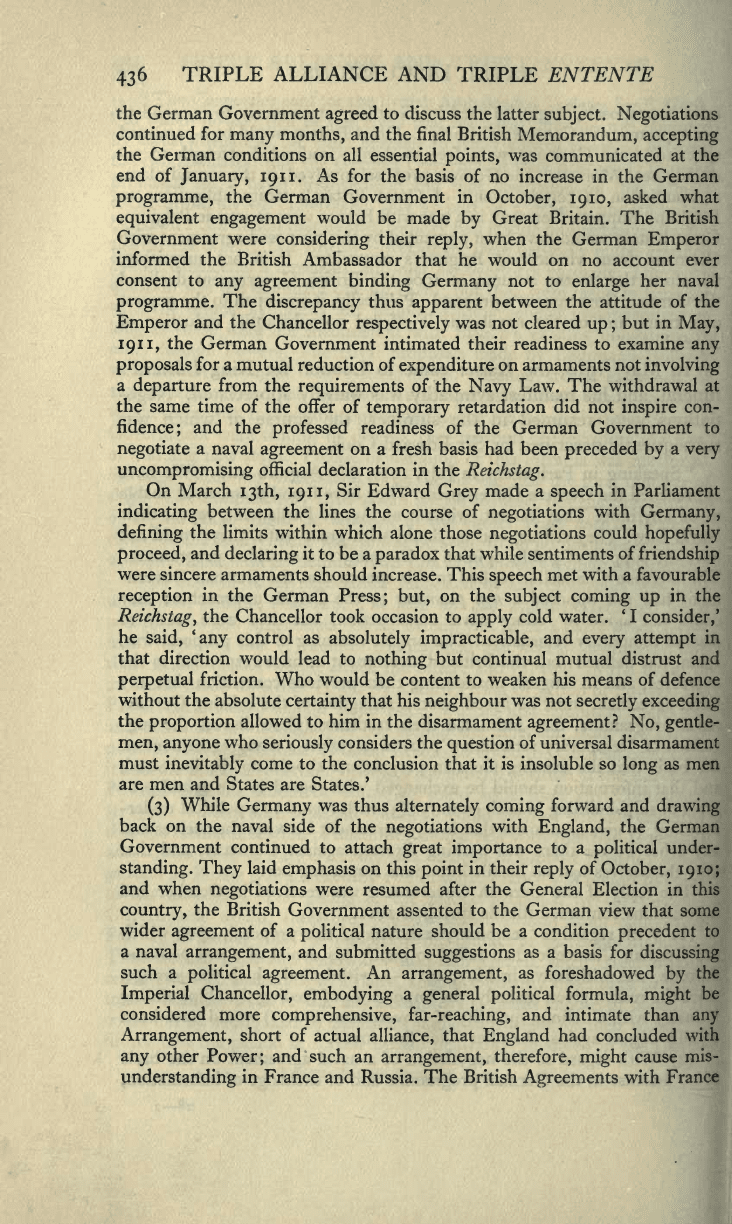
436
TRIPLE ALLIANCE AND
TRIPLE ENTENTE
the German
Government
agreed
to discuss
the
latter
subject.
Negotiations
continued
for
many
months,
and
the final British
Memorandum,
accepting
the German conditions on
all essential
points,
was
communicated
at the
end
of
January,
191
1. As
for
the basis of no
increase
in the German
programme,
the German
Government
in
October,
19
10,
asked what
equivalent
engagement
would
be made
by
Great
Britain.
The
British
Government were
considering
their
reply,
when the
German
Emperor
informed the
British
Ambassador that he would on
no account
ever
consent to
any
agreement
binding
Germany
not to
enlarge
her
naval
programme.
The
discrepancy
thus
apparent
between the attitude
of the
Emperor
and
the
Chancellor
respectively
was not cleared
up
;
but
in
May,
191
1,
the German
Government intimated their readiness to examine
any
proposals
for
a
mutual reduction of
expenditure
on armaments
not
involving
a
departure
from
the
requirements
of
the
Navy
Law. The
withdrawal
at
the
same time of
the
offer
of
temporary
retardation
did not
inspire
con-
fidence;
and
the
professed
readiness
of
the German
Government
to
negotiate
a
naval
agreement
on a
fresh basis
had
been
preceded
by
a
very
uncompromising
official
declaration
in
the
Reichstag.
On
March
13th,
191
1,
Sir
Edward
Grey
made a
speech
in Parliament
indicating
between
the lines the course of
negotiations
with
Germany,
defining
the limits within
which alone those
negotiations
could
hopefully
proceed,
and
declaring
it to
be a
paradox
that while sentiments
of
friendship
were sincere
armaments should
increase. This
speech
met with
a favourable
reception
in
the German
Press;
but,
on the
subject
coming up
in the
Reichstag,
the
Chancellor took
occasion
to
apply
cold
water.
'
I
consider/
he
said,
'any
control as
absolutely impracticable,
and
every attempt
in
that
direction would
lead to
nothing
but continual
mutual distrust and
perpetual
friction.
Who would
be content
to weaken his means of defence
without
the
absolute
certainty
that his
neighbour
was not
secretly exceeding
the
proportion
allowed
to him in
the
disarmament
agreement?
No,
gentle-
men,
anyone
who
seriously
considers
the
question
of
universal disarmament
must
inevitably
come
to
the
conclusion
that
it is insoluble so
long
as men
are men and
States are
States/
(3)
While
Germany
was thus
alternately coming
forward
and
drawing
back on
the naval
side of
the
negotiations
with
England,
the German
Government
continued to
attach
great
importance
to a
political
under-
standing. They
laid
emphasis
on
this
point
in their
reply
of
October,
19
10;
and
when
negotiations
were resumed after
the
General Election in this
country,
the
British
Government
assented
to the
German
view that some
wider
agreement
of
a
political
nature should
be a
condition
precedent
to
a naval
arrangement,
and
submitted
suggestions
as a
basis for
discussing
such
a
political agreement.
An
arrangement,
as
foreshadowed
by
the
Imperial
Chancellor,
embodying
a
general
political
formula,
might
be
considered more
comprehensive, far-reaching,
and
intimate
than
any
Arrangement,
short of
actual
alliance,
that
England
had
concluded
with
any
other
Power;
and
such an
arrangement,
therefore,
might
cause
mis-
understanding
in
France
and
Russia.
The
British
Agreements
with
France
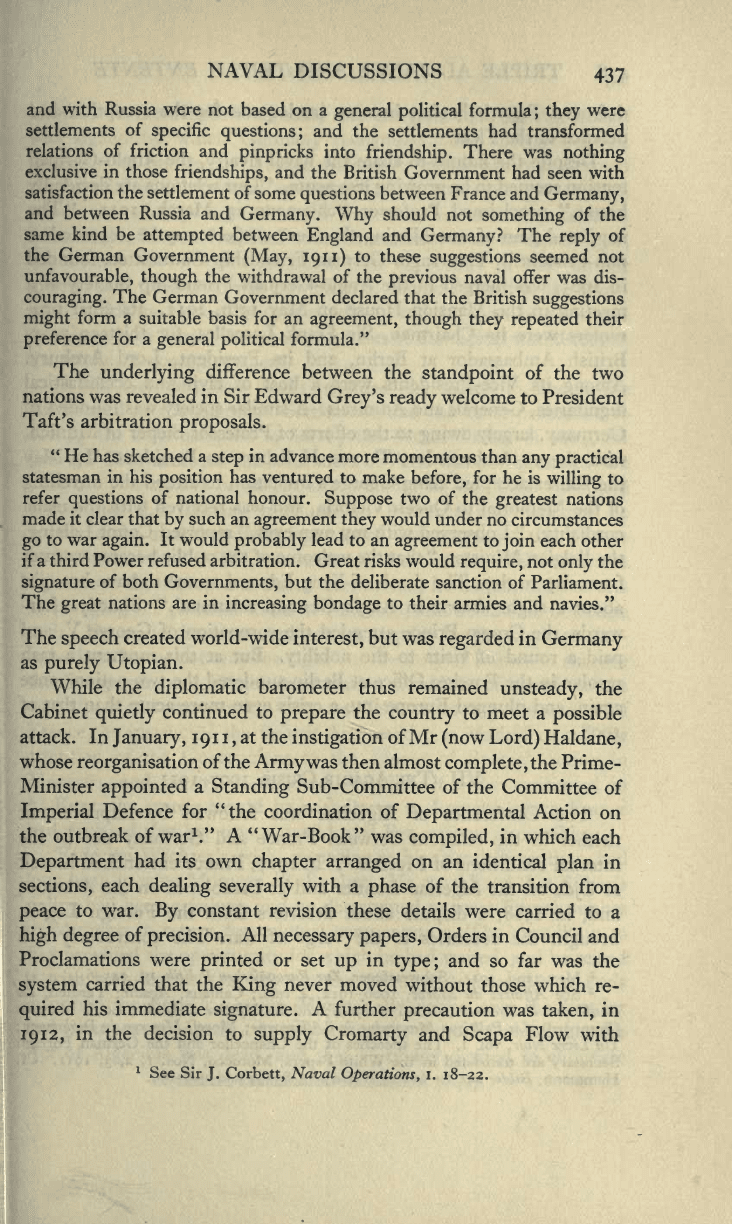
NAVAL
DISCUSSIONS
437
and with Russia were
not
based on a
general political
formula;
they
were
settlements
of
specific
questions;
and
the settlements had transformed
relations
of
friction and
pinpricks
into
friendship.
There
was
nothing
exclusive
in those
friendships,
and
the British
Government
had seen
with
satisfaction the
settlement of
some
questions
between
France
and
Germany,
and
between Russia
and
Germany. Why
should
not
something
of
the
same
kind
be
attempted
between
England
and
Germany?
The
reply
of
the German
Government
(May, 191
1)
to
these
suggestions
seemed
not
unfavourable,
though
the
withdrawal of the
previous
naval offer was dis-
couraging.
The
German
Government
declared that
the British
suggestions
might
form
a
suitable basis for an
agreement,
though they repeated
their
preference
for a
general political
formula."
The
underlying
difference
between the
standpoint
of
the two
nations was revealed in Sir
Edward
Grey's
ready
welcome
to
President
Taft's arbitration
proposals.
"
He
has
sketched
a
step
in
advance more
momentous than
any practical
statesman in his
position
has
ventured to
make
before,
for
he is
willing
to
refer
questions
of national
honour.
Suppose
two of
the
greatest
nations
made it
clear
that
by
such an
agreement they
would
under no
circumstances
go
to
war
again.
It would
probably
lead to an
agreement
to
join
each
other
if
a
third Power refused
arbitration. Great risks
would
require,
not
only
the
signature
of both
Governments,
but the
deliberate sanction of
Parliament.
The
great
nations
are
in
increasing
bondage
to
their
armies
and
navies."
The
speech
created world-wide
interest,
but was
regarded
in
Germany
as
purely
Utopian.
While the
diplomatic
barometer thus
remained
unsteady,
the
Cabinet
quietly
continued to
prepare
the
country
to
meet
a
possible
attack. In
January, 191
1
,
at the
instigation
of
Mr
(now
Lord)
Haldane,
whose
reorganisation
of
the
Army
was
then
almost
complete,
the
Prime-
Minister
appointed
a
Standing
Sub-Committee
of
the
Committee
of
Imperial
Defence
for
"the
coordination of
Departmental
Action on
the outbreak
of
war
1
." A
"War-Book"
was
compiled,
in
which
each
Department
had
its
own
chapter
arranged
on
an
identical
plan
in
sections,
each
dealing severally
with a
phase
of
the
transition from
peace
to war.
By
constant
revision
these
details
were carried
to a
high
degree
of
precision.
All
necessary
papers,
Orders
in
Council and
Proclamations were
printed
or set
up
in
type;
and so
far was
the
system
carried
that the
King
never moved
without those
which
re-
quired
his
immediate
signature.
A
further
precaution
was
taken,
in
1912,
in
the decision
to
supply
Cromarty
and
Scapa
Flow
with
1
See Sir
J.
Corbett,
Naval
Operations,
I. 18-22.

438
TRIPLE
ALLIANCE AND
TRIPLE
ENTENTE
defences,
Rosyth having
become
inadequate
for
the
reception
and
defence
of
the
Fleet.
Despite
the
failure
to abate the naval
rivalry,
the
Anglo-German
tension
seemed
to
be
growing
less
acute.
"
Our
relations are
decidedly
better,"
proclaimed
Professor Schiemann in
March,
191
1.
"The
supposed
plan
of
annihilating
the
German
fleet
may
be
regarded
as
non-existent.
"
The
Anglo-German
Friendship
Committee,
founded
in
1905,
was
merged
in
the
Anglo-German Friendship
Society
at
a
meeting
in
the
Mansion
House
on
May 15th,
191
1.
Its
chief
pro-
moters
were
its
Chairman,
Sir Frank
Lascelles,
for
thirteen
years
British
Ambassador
at
Berlin,
and
its
President,
Lord
Avebury.
Among
its Vice-Presidents
were a
host
of
civil and ecclesiastical
dignitaries,
Generals
and Admirals.
A
similar
society
was founded
in
Germany, largely
owing
to the efforts
of
Professor
Sieper
of
Munich,
with the
ex-
Ambassador,
T. von
Holleben,
as
President.
In
May
the
Kaiser
accepted
King
George's
invitation to attend the
unveiling
of the
Memorial
to
Queen
Victoria,
and
was
received with the
usual
cordiality.
"
I
observed with
my
own
eyes/'
reported
Count
Lalaing,
the
Belgian
Minister,
"that
the
welcome of
the
public
became
warmer
from
day
to
day.
The
death
of
King
Edward
seems to
have
brought
about
a
slight
detente in
Anglo-German
relations
1
."
Shortly
after-
wards,
the
Crown Prince attended the coronation
of
George
V,
and
paid
a
round of
visits to the
nobility.
But at
this moment
a
rash
resolve
in
the
Foreign
Office at
Berlin sundered
the two
nations
once
again,
and
plunged
Europe
into
a crisis even more acute than
that
of
1908.
VII.
The Agadir
Crisis,
1907-1911
The Conference
of
Algeciras
was followed
by improvement
neither
in
the relations between
France
and
Germany
nor
in
the
internal
conditions of Morocco
2
.
In
1907,
France entrenched
herself
at
Ujda
on
the
Algerian
frontier
and
at
Casablanca
on the
Atlantic;
and,
in
1908,
a
dispute
about
deserters
from
the
Foreign
Legion
brought
the countries
to the
verge
of war. The
controversy
was
1
May
22nd, 191
1.
Schwertfeger,
Zur
Europdischen
Politik,
ill.
245-6.
2
See
Affaires
du
Maroc,
1906-1912, 4
vols.; Caillaux, Agadir
;
Tardieu,
La
Conference
d'
Algeciras
(edition
of
1909);
and
Le
Mystere
d
Agadir;
Louis
Maurice
(Bompard),
La
Politique
Marocaine de
VAllemagne',
Morel,
Morocco in
Diplomacy;
Un
Livre
Noir,
vol. 1.
The
speeches
of
the Chancellor
and the German
Foreign
Secretary
are translated
in the
White
Papers,
Morocco,
Nos.
1, 2, 3, 191
1.
Cf.
Hammann,
Bilder
aus der letzten Kaiserzeit.
83-94
and
156-159.
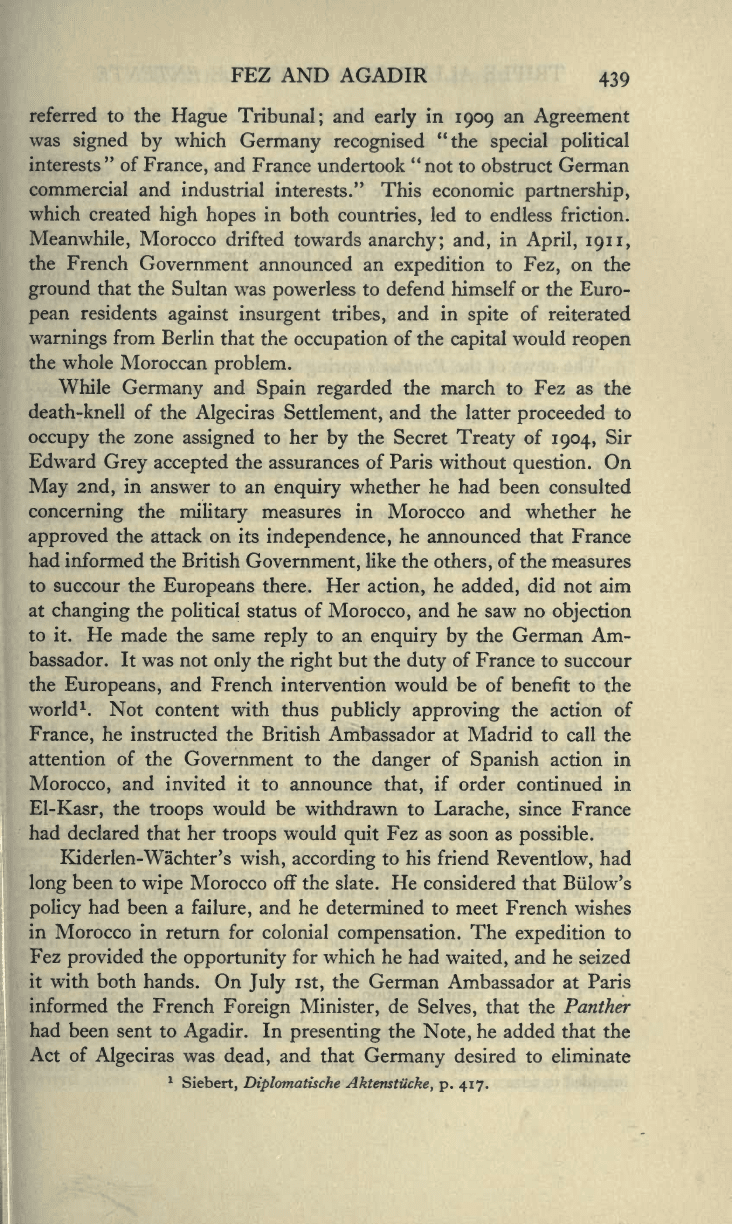
FEZ AND
AGADIR
439
referred to
the
Hague
Tribunal;
and
early
in
1909
an
Agreement
was
signed
by
which
Germany recognised
"the
special
political
interests" of
France,
and
France
undertook "not to
obstruct
German
commercial and
industrial
interests." This economic
partnership,
which
created
high
hopes
in
both
countries,
led
to endless
friction.
Meanwhile,
Morocco
drifted towards
anarchy;
and,
in
April,
191
1,
the French
Government
announced an
expedition
to
Fez,
on
the
ground
that
the
Sultan was
powerless
to defend himself or
the
Euro-
pean
residents
against
insurgent
tribes,
and
in
spite
of
reiterated
warnings
from
Berlin
that the
occupation
of
the
capital
would
reopen
the whole
Moroccan
problem.
While
Germany
and
Spain regarded
the march
to
Fez as
the
death-knell of
the
Algeciras
Settlement,
and the
latter
proceeded
to
occupy
the
zone
assigned
to
her
by
the
Secret
Treaty
of
1904,
Sir
Edward
Grey accepted
the assurances
of Paris
without
question.
On
May
2nd,
in
answer to an
enquiry
whether he had been
consulted
concerning
the
military
measures in
Morocco and
whether he
approved
the
attack
on
its
independence,
he
announced that
France
had
informed
the
British
Government,
like the
others,
of
the measures
to succour
the
Europeans
there. Her
action,
he
added,
did
not
aim
at
changing
the
political
status
of
Morocco,
and
he saw no
objection
to
it. He made
the same
reply
to an
enquiry by
the German Am-
bassador. It was
not
only
the
right
but
the
duty
of France
to
succour
the
Europeans,
and French
intervention would be
of
benefit to the
world
1
.
Not content with thus
publicly approving
the action of
France,
he
instructed the British Ambassador
at
Madrid
to
call
the
attention of
the
Government
to the
danger
of
Spanish
action
in
Morocco,
and
invited it to announce
that,
if
order continued in
El-Kasr,
the
troops
would be
withdrawn
to
Larache,
since France
had
declared
that her
troops
would
quit
Fez as soon as
possible.
Kiderlen-Wachter's
wish,
according
to his friend
Reventlow,
had
long
been to
wipe
Morocco off
the slate.
He considered
that
Billow's
policy
had
been a
failure,
and
he determined
to meet French wishes
Morocco in
return
for colonial
compensation.
The
expedition
to
ez
provided
the
opportunity
for which
he had
waited,
and he
seized
it with both hands.
On
July
1st,
the
German Ambassador
at
Paris
informed
the French
Foreign
Minister,
de
Selves,
that the
Panther
had
been
sent to
Agadir.
In
presenting
the
Note,
he added that the
Act
of
Algeciras
was
dead,
and
that
Germany
desired
to eliminate
1
Siebert,
Diplomatische Aktenstiicke,
p. 417.
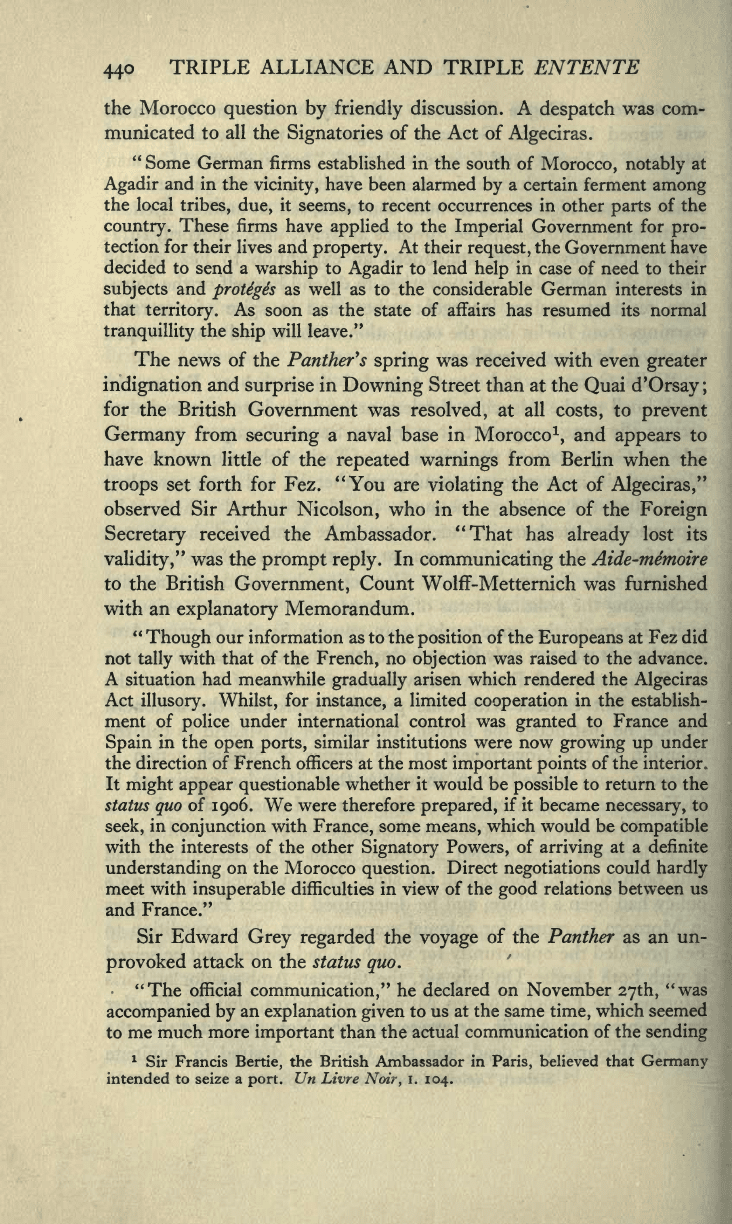
440
TRIPLE ALLIANCE AND
TRIPLE ENTENTE
the Morocco
question
by friendly
discussion. A
despatch
was com-
municated to
all
the
Signatories
of
the
Act
of
Algeciras.
"
Some German firms
established
in
the south of
Morocco,
notably
at
Agadir
and
in
the
vicinity,
have
been alarmed
by
a
certain ferment
among
the local
tribes, due,
it
seems,
to
recent occurrences in
other
parts
of
the
country.
These
firms have
applied
to the
Imperial
Government for
pro-
tection for
their lives and
property.
At their
request,
the Government
have
decided to
send a
warship
to
Agadir
to lend
help
in
case of
need
to their
subjects
and
proteges
as well as to the
considerable German interests
in
that
territory.
As soon as the state of
affairs has resumed
its normal
tranquillity
the
ship
will
leave."
The news of
the
Panther's
spring
was
received with even
greater
indignation
and
surprise
in
Downing
Street than at the
Quai
d'Orsay
;
for
the
British
Government
was
resolved,
at
all
costs,
to
prevent
Germany
from
securing
a naval base
in
Morocco
1
,
and
appears
to
have
known
little
of
the
repeated
warnings
from
Berlin when the
troops
set forth
for
Fez. "You
are
violating
the
Act
of
Algeciras,"
observed
Sir
Arthur
Nicolson,
who
in
the absence of
the
Foreign
Secretary
received
the
Ambassador.
"That
has
already
lost its
validity,"
was
the
prompt reply.
In
communicating
the
Aide-memoire
to the British
Government,
Count
Wolff-Metternich was
furnished
with
an
explanatory
Memorandum.
"
Though
our information as to the
position
of the
Europeans
at
Fez
did
not
tally
with that of the
French,
no
objection
was raised to the
advance.
A situation had meanwhile
gradually
arisen
which rendered the
Algeciras
Act
illusory.
Whilst,
for
instance,
a limited
cooperation
in the establish-
ment
of
police
under
international control was
granted
to France
and
Spain
in
the
open
ports,
similar institutions were
now
growing up
under
the direction
of
French officers at the most
important points
of the interior.
It
might appear questionable
whether
it would be
possible
to return to the
status
quo
of
1906.
We were therefore
prepared,
if it became
necessary,
to
seek,
in
conjunction
with
France,
some
means,
which would
be
compatible
with
the
interests of
the other
Signatory
Powers,
of
arriving
at a definite
understanding
on
the Morocco
question.
Direct
negotiations
could
hardly
meet with
insuperable
difficulties
in
view
of the
good
relations between
us
and
France."
Sir Edward
Grey
regarded
the
voyage
of
the Panther as
an
un-
provoked
attack
on
the status
quo.
"The
official
communication,"
he
declared
on
November
27th,
"was
accompanied by
an
explanation
given
to
us at the same
time,
which seemed
to me
much more
important
than the
actual
communication of the
sending
1
Sir Francis
Bertie,
the
British
Ambassador
in
Paris,
believed that
Germany
intended to seize
a
port.
Un Livre
Noir,
I.
104.

ANXIETY
OF
SIR
EDWARD GREY
441
of
the
ship
It made it
clear that the German
Government
regarded
a
return
to
the
status
quo
in
Morocco
as
doubtful,
if
not
impossible,
and that
what
they
contemplated
was
a
definite solution
of the
Moroccan
question
between
Germany,
France,
and
Spain.
The whole
question,
or at least
the
kernel of
the
question,
after
that communication
was
received,
was
: What
was the definite solution of
the Moroccan
question
which
Germany
con-
templated?
Was
it
to be the
partition
of Morocco?
The communication
was made to the
Foreign
Office
on the
Saturday.
On the next
Monday,
July
3rd,
I asked
the
German
Ambassador to come
and see me.
I informed
him I had
seen
the
Prime-Minister,
and that we considered
the situation
created
by
the
despatch
of
the
Panther
to
Agadir
as so
important
that it
must be discussed in a
meeting
of
the
Cabinet. The next
day,
I asked
the
German Ambassador to
come
and see me
again,
and said that
I must tell
him
that our
attitude could not be
a disinterested
one with
regard
to
Morocco.
We must take
into consideration
our
Treaty
obligations
to
France
and
our own interests
in
Morocco.
We were
of
opinion
that a new
situation
had
been created
by
the
despatch
of
a German
ship
to
Agadir.
Future
developments might
affect British interests
more
directly
than
they
had
hitherto
been
affected, and, therefore,
we could not
recognise
any
new
arrangements
that
might
be come to
without
us.
I made it
quite
clear
to
the
Ambassador that this
communication,
and the exact
words which
I
used,
were those
of
his
Majesty's
Government
sitting
in
Cabinet."
The
Ambassador
replied
that
his
Government
had
absolutely
no
wish
to
exclude
England
from the new
arrangement
of
things,
or
to
prevent
any
possible
safeguarding
of British
interests
in Morocco.
The
Foreign Secretary
made a simultaneous
declaration
to the
French Ambassador.
"The British
Government deems
a
discussion
necessary
between
France,
Germany, Spain
and
England.
But before it
opens
the British
Government
must
know what
the French Government desires.
For
instance,
the
solution
might
be a
return
to
the
status
quo, Germany retiring
from
Agadir,
Spain
from
El-Kasr
and
Larache,
and
France
from
Fez
and the interior.
Or
there
might
be
a
new
arrangement consolidating
the
position
of
France,
securing
the assent of
Germany by
certain
compensations.
In that
case,
Great
Britain
would have to
see
what conditions
were
required
in
her
own
interests."
The Ambassador
replied
that the
French
had
already
left
Fez,
that
the French
Military
Mission,
dating
from
before
Algeciras,
did not
constitute
occupation,
and
that
the
posts
in
the interior
were
merely
to
supply
the
troops.
Next
day,
the French
Premier
telegraphed
that
his
Ministry
would
examine the solution to be
proposed
by
Great
Britain
and ask
her
support
for
it
in the
discussions to
which
Germany
invited
them. "I
must, however,
make
clear at once
to the
British

442
TRIPLE
ALLIANCE
AND
TRIPLE ENTENTE
Government the
impossibility
of
compensations
in Morocco.
Since
Germany
asks us
to
talk,
she
must tell us
her wishes." After
thus
sounding
France,
the
Prime-Minister stated
the attitude
of Great
Britain,
in
reply
to Mr Balfour on
July
6th.
Recent events
were the
subject
of
negotiation
between the Powers
most
interested,
and
he
wished
it
clearly
to
be
understood
that the
Government
considered
that
a
new
situation
had
arisen in
Morocco,
in which
it
was
possible
that future
developments
might
affect British interests
more
directly
than had
been
the case. He was
confident that
diplomatic
discussion
would
find a
solution,
and
in
the
part
we should
take
in
it
we
should
have
due
regard
to the
promotion
of
those
interests
and
to
the
fulfil-
ment
of
our
treaty obligations
to
France,
which were
well known
to
the House.
On
July
9th,
Kiderlen-Wachter
and
Jules
Cambon
began
the
conversations,
which
were
to
continue
for four months. The
German
Foreign
Minister declared himself
ready
to renounce territorial
claims in
Morocco,
and asked for
compensation
in
the
Congo.
It
would be
impossible,
he
added,
to admit
a
third
party
to the
dis-
cussions
without
inviting
all
the
Signatories
of
the
Treaty
of
Algeciras.
The
Ambassador did
not
demur,
but remarked that
France
must
keep
her friends and allies informed. While these conversations
were
proceeding
in
Berlin,
the British Government
were
waiting
for news.
Sir Edward
Grey
regarded
his communication
of
July
4th
as a
request
for
information;
but it
had
not
been couched
in an
interrogatory
form. "The
declaration that
Agadir
created
a new
situation,"
declared the German Chancellor on December
5th,
"did
not
appear
to
us
an
enquiry necessitating
an answer." Both
parties
were,
no
doubt*
to blame
—
Sir
Edward
Grey
in
not
definitely asking
for ex-
planations,
the German
Government
in
failing
to
volunteer
a re-
assuring
statement.
In
the absence
of direct
communication
suspicion
was inevitable.
"After
July 4th,"
declared the
Foreign
Secretary
on November
27th,
"
there
was a
period
of
silence.
The German
Ambassador
was not instructed
to
make
any
comment to
me with
regard
to
my
communication,
and we
received
no information
from
the
German
Government
as to
what their
aims
or
desires
were,
or
as to what
they
had in mind when
they spoke
of
a
definite
solution
of
the
Moroccan
problem.
Some
information
reached
us
from
other
quarters,
leading
us
to
apprehend
that the settlement
con-
templated
by
the German
Government
might
be
a
partition
of
Morocco,
arrived
at
by negotiations
to which
it was
not intended
we should
be
a
party.
It is
obvious,
if
the
Moroccan'
question
was
to
be
reopened
and
a
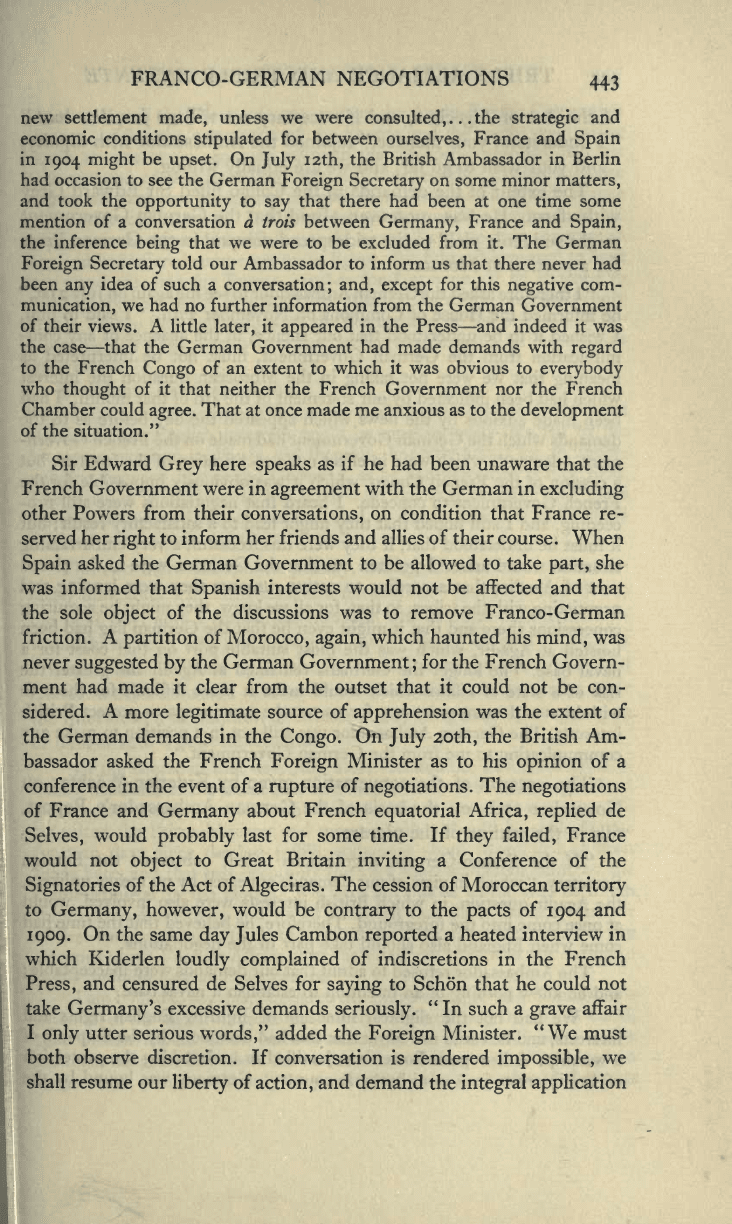
FRANCO-GERMAN NEGOTIATIONS
443
new
settlement
made,
unless we were
consulted,.
. .the
strategic
and
economic
conditions
stipulated
for between
ourselves,
France
and
Spain
in
1904 might
be
upset.
On
July
12th,
the British
Ambassador in Berlin
had occasion to see the
German
Foreign Secretary
on
some
minor
matters,
and
took
the
opportunity
to
say
that
there
had
been at one time
some
mention of
a
conversation a trois between
Germany,
France and
Spain,
the inference
being
that we
were
to
be
excluded from
it. The German
Foreign Secretary
told
our Ambassador
to
inform
us that
there never
had
been
any
idea
of
such a
conversation; and,
except
for this
negative
com-
munication,
we
had
no further information from
the
German Government
of their
views.
A
little
later,
it
appeared
in the Press
—
and
indeed
it was
the case
—
that
the German Government
had
made demands with
regard
to the French
Congo
of an
extent to which
it was obvious
to
everybody
who
thought
of it that
neither
the French Government nor
the
French
Chamber could
agree.
That at once made me anxious as to the
development
of the
situation."
Sir
Edward
Grey
here
speaks
as if
he had been unaware
that
the
French
Government
were in
agreement
with the German in
excluding
other Powers from their
conversations,
on condition that France re-
served
her
right
to
inform her friends
and
allies
of
their course. When
Spain
asked the German
Government to be allowed to take
part,
she
was informed that
Spanish
interests
would
not
be
affected and that
the sole
object
of the discussions
was
to remove Franco-German
friction.
A
partition
of
Morocco,
again,
which
haunted his
mind,
was
never
suggested
by
the German
Government
;
for the French Govern-
ment
had made
it
clear
from
the outset that it could not be con-
sidered.
A
more
legitimate
source of
apprehension
was the extent
of
the German
demands in the
Congo.
On
July
20th,
the British
Am-
bassador asked the
French
Foreign
Minister as
to
his
opinion
of a
conference
in
the event
of a
rupture
of
negotiations.
The
negotiations
of France and
Germany
about
French
equatorial
Africa,
replied
de
Selves,
would
probably
last
for some
time.
If
they
failed,
France
would not
object
to Great
Britain
inviting
a
Conference
of
the
Signatories
of
the Act
of
Algeciras.
The
cession
of
Moroccan
territory
to
Germany,
however,
would be
contrary
to the
pacts
of
1904
and
1909.
On the same
day
Jules
Cambon
reported
a heated interview
in
which
Kiderlen
loudly
complained
of
indiscretions
in
the
French
Press,
and
censured de Selves for
saying
to Schon
that
he could
not
take
Germany's
excessive demands
seriously.
"In
such
a
grave
affair
I
only
utter serious
words,"
added
the
Foreign
Minister.
"We
must
both
observe
discretion.
If
conversation is
rendered
impossible,
we
shall
resume
our
liberty
of
action,
and
demand
the
integral
application
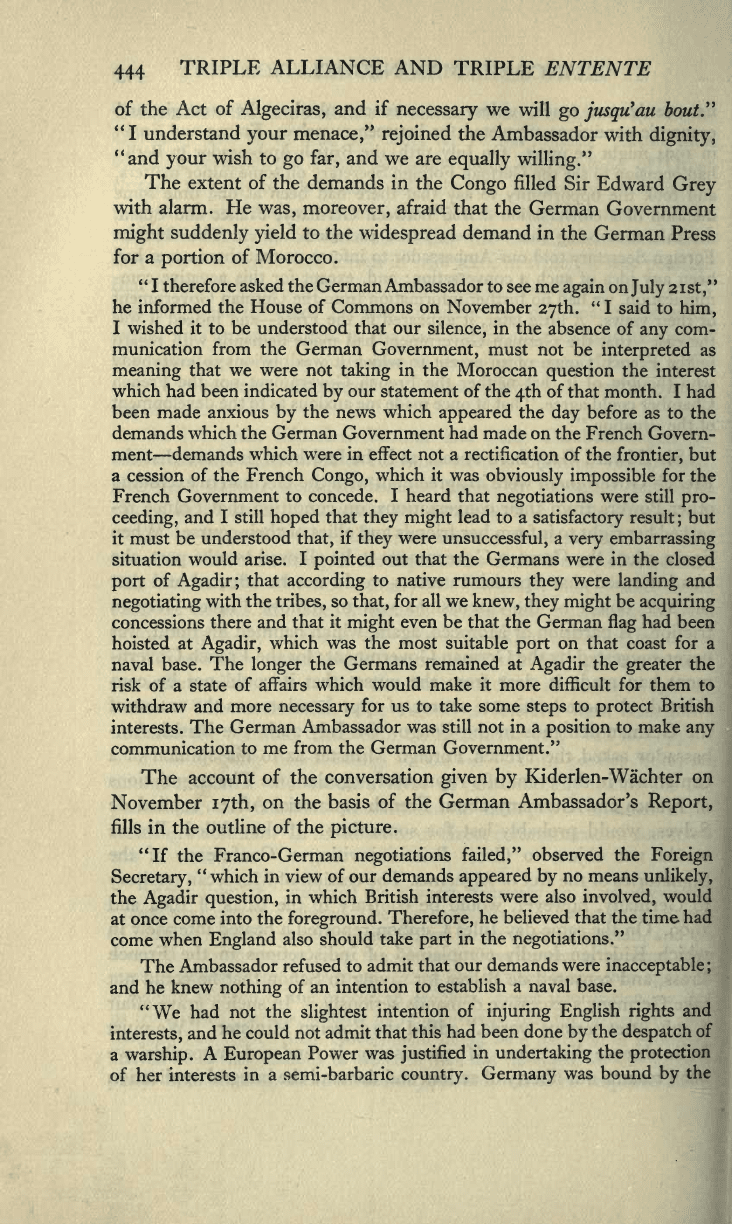
444
TRIPLE
ALLIANCE
AND
TRIPLE
ENTENTE
of
the
Act
of
Algeciras,
and if
necessary
we
will
go
jusqu'au
bout."
"
I understand
your
menace,"
rejoined
the
Ambassador
with
dignity,
"and
your
wish
to
go
far,
and
we are
equally
willing."
The extent
of
the demands in
the
Congo
filled
Sir
Edward
Grey
with alarm. He
was, moreover,
afraid
that the
German
Government
might
suddenly
yield
to
the
widespread
demand in
the
German Press
for a
portion
of Morocco.
"
I
therefore
asked the German
Ambassador to
see me
again
on
July
21st,
"
he
informed the House
of
Commons on
November
27th.
"I said to
him,
I wished it to be understood that our
silence,
in
the
absence of
any
com-
munication
from
the German
Government,
must
not
be
interpreted
as
meaning
that we were not
taking
in
the
Moroccan
question
the
interest
which had been
indicated
by
our
statement of the
4th
of that
month.
I had
been
made anxious
by
the news which
appeared
the
day
before
as to
the
demands
which the German Government
had
made
on
the
French Govern-
ment
—
demands
which were
in
effect
not
a
rectification
of
the
frontier,
but
a
cession
of the French
Congo,
which it was
obviously impossible
for
the
French Government
to
concede.
I
heard that
negotiations
were still
pro-
ceeding,
and
I
still
hoped
that
they might
lead to
a
satisfactory
result
;
but
it
must be understood
that,
if
they
were
unsuccessful,
a
very embarrassing
situation
would arise.
I
pointed
out that the
Germans were in the closed
port
of
Agadir;
that
according
to native rumours
they
were
landing
and
negotiating
with
the
tribes,
so
that,
for
all we
knew,
they
might
be
acquiring
concessions
there
and that it
might
even be
that
the German
flag
had been
hoisted
at
Agadir,
which was the most suitable
port
on that coast for a
naval base.
The
longer
the
Germans remained
at
Agadir
the
greater
the
risk
of a state
of affairs which
would make it more
difficult
for them
to
withdraw
and
more
necessary
for us to take
some
steps
to
protect
British
interests.
The
German
Ambassador was still not
in a
position
to
make
any
communication
to me
from
the
German
Government."
The account
of
the
conversation
given by
Kiderlen-Wachter on
November
17th,
on
the
basis
of
the
German
Ambassador's
Report,
fills in
the
outline
of
the
picture.
"If the
Franco-German
negotiations
failed,"
observed the
Foreign
Secretary,
"
which
in
view
of our demands
appeared
by
no means
unlikely,
the
Agadir
question,
in
which British
interests
were also
involved,
would
at once come
into the
foreground.
Therefore,
he believed
that the time
had
come
when
England
also should
take
part
in
the
negotiations."
The
Ambassador refused
to
admit
that
our demands were
inacceptable
;
and he
knew
nothing
of an intention
to
establish
a naval
base.
"We
had
not
the
slightest
intention
of
injuring
English rights
and
interests,
and
he
could not
admit that
this
had
been done
by
the
despatch
of
a
warship.
A
European
Power
was
justified
in
undertaking
the
protection
of
her
interests
in
a
semi-barbaric
country.
Germany
was bound
by
the
